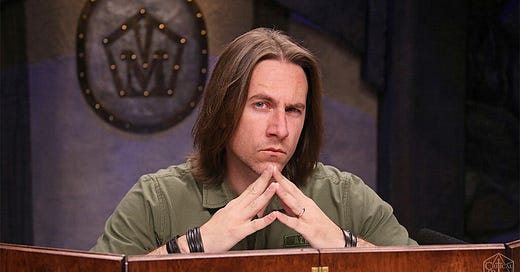The contradictions of modern gaming and its focus on story and experience over the game have a profound impact on the role of the Game Master. The role of GM should be that of a referee. The GM knows the gist of the rules, knows where to reference the more granular and situational rules, and arbititrates when conflict or disagreement over rules comes up. He also controls the players’ enemies and other NPCs in smaller groups. The GM is not a storyteller nor is the GM responsible for ensuring that everyone's happy. However, modern gamers demand these things from their GMs. As a result, modern GMs are burning out faster than ever as they feel the pressure to create epic fantasy stories but also leave enough latitude for players to feel as though their choices matter. As if that weren’t enough, players are also imposing their own pet issues, preferences and agendas on their GMs, often harshly. The result is that the person who should be the keeper of the rules, the GM, feels he must bend, alter or break the rules to accommodate the whims of their players. The GM has become a service provider rather than an impartial judge and this undermines the foundation of the game.
At the heart of this lies a central issue. All organized games need officials who enforce the rules. RPGs are organized games. Whether you’re playing with friends or as a part of some larger organization, an RPG group is an organized body adhering to a set of rules. That requires an official who is familiar with the rules and able to reference those he does not have memorized in order to make sure that the game is played correctly. As a GM, you are the official. This is why many early games called the GM the Referee or the Judge. The role of Game Master is born out of the role of the referee in war games, which were often played as a part of organized clubs. The role of official implies two things about the Game Master. Firstly, he is impartial. He is the one who arbitrates according to the standards set forth by the rules. He should not favor one side or the other, but instead he should favor the rules. Secondly, the GM has authority. Because the GM is the enforcer of the rules, his rulings should be treated as the rules themselves by the players.
These two things, impartiality and authority, denote a degree of separation from the players. To debunk a modern myth, the GM is not “Just another player.” The GM is the one who has taken on more responsibility than the other players. He creates the world, fills it with things to explore and discover, and reacts to the players’ actions. The players should honor this sacrifice by submitting themselves to the rulings of the GM who enables the game to happen in the first place. That being said, the GM should not abuse this authority by imposing his vision on the players. There’s an understanding and a balance of power at play that makes everything work. When the official says “No, you cannot do that,” you don’t argue, but the GM should not rule against the ruleset that governs the game. This is the balance that works, but it’s not the balance that’s present at modern tables.
By contrast, modern tables expect their GMs to be storytellers. A GM must come up with an elaborate storyline that makes the players feel like heroes in their favorite shows and games. But, the GM should also be expected to incorporate player backstories which often read like bad fantasy novels. Believe me, I’ve written a few cringe backstories. At the same time, the GM should be cautious not to set off any hidden traumas the player may claim to suffer from. Also, the game can’t be too predictable or too on-rails or the players will complain. These ideas all pull against each other and also pull against the core duties of being a GM. Player satisfaction has become such a heavy emphasis that is pressures GMs to cheat on behalf of their players so that the “story” can be forwarded. Make no mistake, fudging dice is cheating. As we’ve discussed in other articles, players have become so precious about their characters that allowing them to die has become a taboo. GMs act like killing a PC is some kind of tragedy when, if played correctly, it should be fairly common at least early on. The GM becomes nothing more than a service provider being dictated to by customers when these things become priorities.
This outlook undermines the idea of a game itself and puts more work on the GM than should be present. This is an idea that we will revisit tomorrow, but I will close by saying that GMs are not storytellers. They are not service providers either. GMs are referees who make impartial rulings based on the rules everyone agreed to abide by. They react to player action and, when necessary, make judgements.




